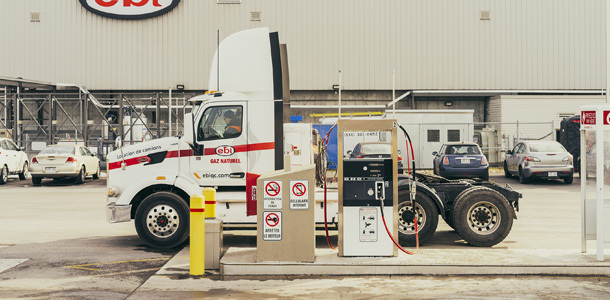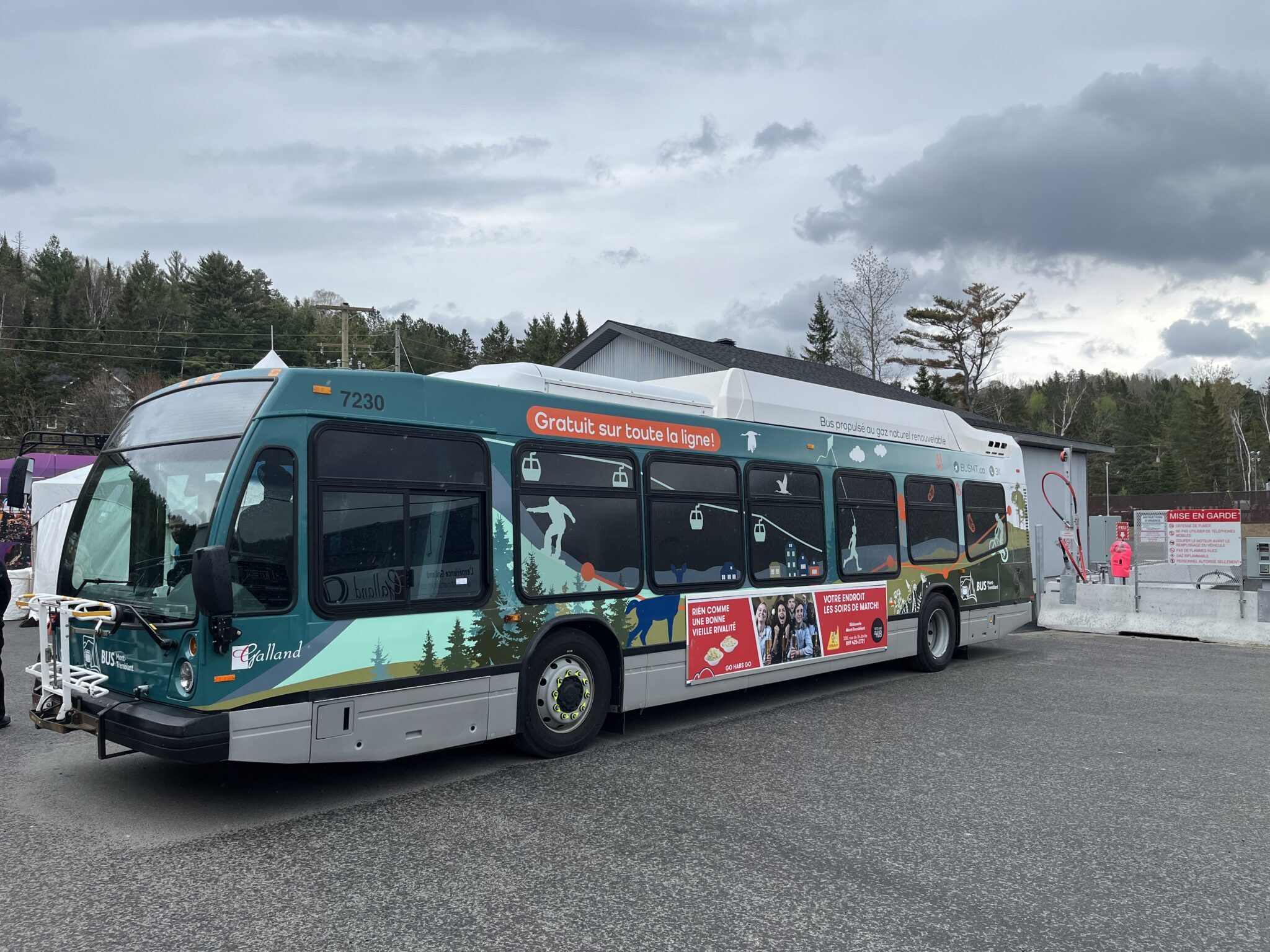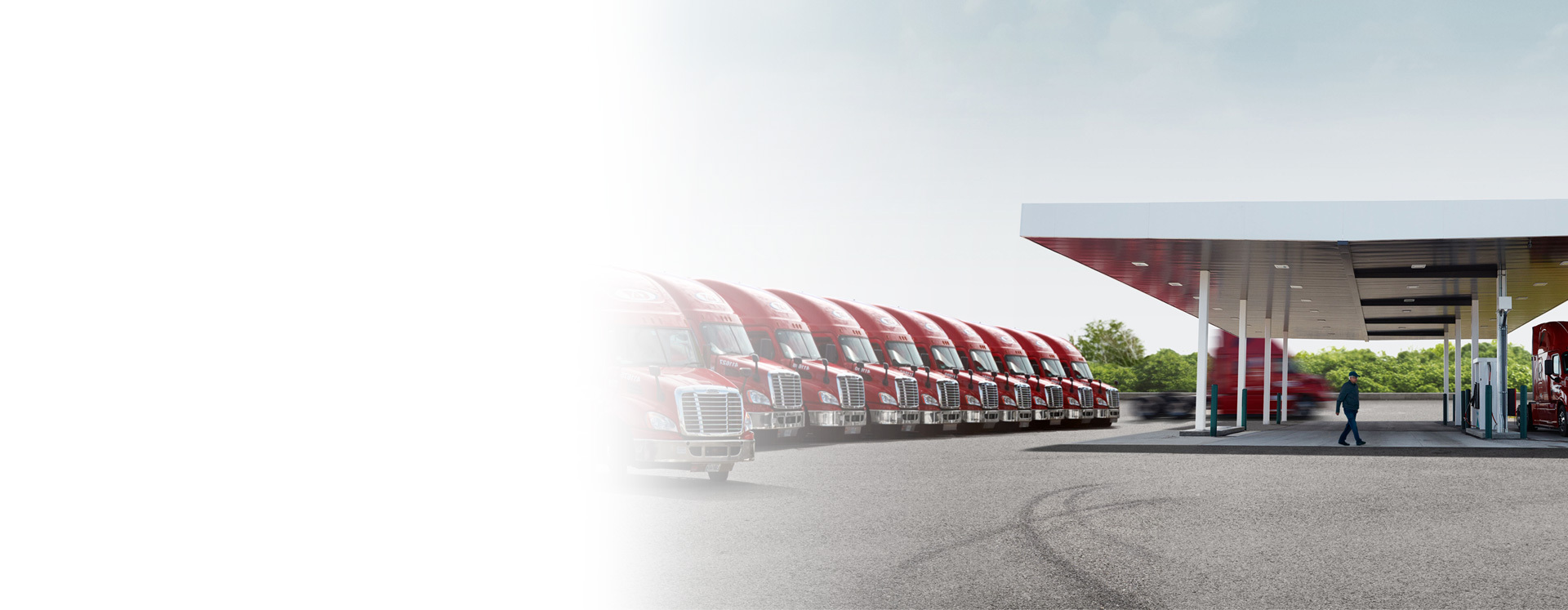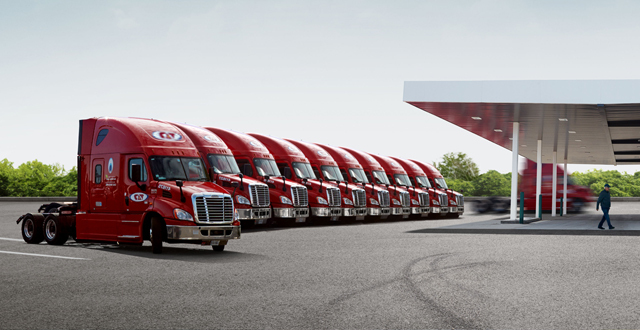An alternative fuel with its place
In Quebec and the rest of North America, more and more trucks now run on natural gas because of its economic and environmental advantages over diesel*.
Now that renewable natural gas (RNG) has entered Quebec’s energy mix, fleet managers operating natural gas vehicles can cut fossil-based GHG emissions without changing engines—while continuing to refuel at the same stations.
Did you know that a growing number of truck fleets around the world are switching to RNG? In 2023, 97% of all on-road fuel used in natural gas vehicles in California was renewable natural gas**. In the U.S. overall, that figure was 79%. Interest in RNG is emerging in Quebec, among freight transportation companies in particular.


Cleaner options for your fleet
Heavy-duty vehicles account for nearly 9% of Quebec’s total greenhouse gas (GHG) emissions1. Énergir offers solutions to help make trucking less emissions-intensive.
Fossil natural gas and renewable natural gas (RNG), available in compressed forms, are two viable options for transportation companies in the process of kick-starting or scaling up their decarbonization efforts by transitioning away from diesel.
Taking the fuel life cycle into account, CNG can reduce GHG emissions by up to 30%2 compared with diesel. This reduction can be even greater in the case of compressed renewable natural gas.
Take advantage of generous grants
Thanks to the Ecotrucking program, you could receive a subsidy of up to $30,0003 to purchase a natural gas truck.

Choose RNG
Renewable natural gas (RNG), available in compressed (CNG-R) form, is a viable fuel option for vehicles. In addition to capturing methane from decomposing organic waste, RNG can reduce GHG emissions compared to diesel.
Interested in renewable natural gas? Contact us to learn more.
Groupe Galland chooses GNR for new Mont-Tremblant buses
In May 2024, Groupe Galland and the Ville de Mont-Tremblant inaugurated a public transit line using buses powered by compressed natural gas. In addition, the company contracted the purchase of renewable natural gas (RNG) to further reduce its fossil GHG emissions, a first in Quebec.

Ready to make the switch?
Interested in natural gas? Want to discuss your project?
Six myths about natural gas for vehicles (NGV)
Natural gas use in the transportation sector is growing rapidly in North America, and Quebec is no exception. More and more companies are choosing to convert their fleet or part of their fleet to natural gas for a number of reasons. First, in addition to being a cost-effective option, natural gas vehicles have a long range and are as safe as diesel vehicles. Second, the number of refuelling stations in the public network is growing and truckers can rely on multiple refuelling and service stations in Quebec, Ontario and the United States.
FALSE.
Fuel used to propel a vehicle and stored in the vehicle is not considered a hazardous material. So, there is no problem with natural gas trucks using tunnels.
False.
Depending on the capacity of the tanks installed (up to 295 gallons of diesel gallon equivalent or DGE), a truck can easily cover over 1,800 km on a full tank.
False.
Filling the tank of a natural gas truck at a public station is as fast as filling up a diesel truck. What’s more, refuelling a natural gas truck requires no supervision or competency card, unlike propane.
False.
The price of natural gas is much more stable than that of gasoline and diesel and is not dependent on the price of a barrel of oil. At the pump, the price of compressed natural gas (CNG) generates savings on the order of 40% on your fuel bill compared to diesel.
False.
Natural gas is just as safe – even safer – than diesel. Compared to diesel, the concentration of natural gas in the air must be much greater, and its temperature much higher, for it to catch on fire. Since natural gas is stored under pressure, the tanks are designed with a thick aluminum wall, reinforced with carbon fibre, and so they resist impacts much better than diesel tanks.
False.
If the manufacturer’s recommendations are followed, the maintenance costs of a natural gas truck are comparable to those of a diesel truck. And since natural gas trucks do not need complex systems for treating exhaust gases (or for urea, or filters for particulates), their long-term reliability may turn out to be superior to that of a diesel truck.
1 - Décarbonation du transport lourd de marchandises : Construire une voie durable (in French only
2 - Comparison of CNG and landfill-sourced RNG with a diesel engine. According to MELCCFP’s Guide de quantification des émissions de gaz à effet de serre, 2025, 126 p. (PDF, in French only)
3 - Certain conditions apply. Details and eligibility requirements are available at this page. Program subject to change without notice.
*For more information on these benefits, see the emissions calculation methodology page.
**California’s Low Carbon Fuel Standard (LCFS) sets specific carbon intensity requirements for transportation fuels sold in the state. It encourages the use of low-carbon fuels such as RNG.

